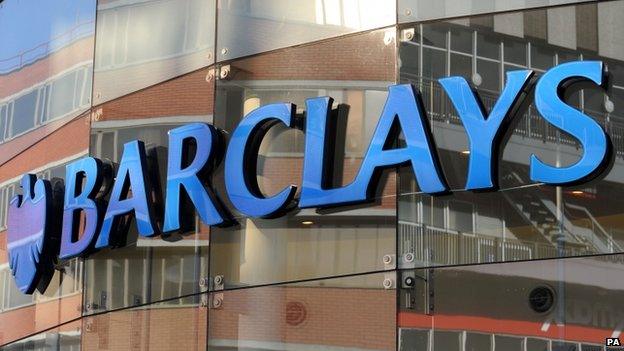No fall in Barclays bonuses
- Published
- comments

I would expect Barclays in results on Tuesday to disclose it is paying more in bonuses to its investment bankers than the £1.3bn it paid for 2012 - and that it has allocated a higher proportion of investment banking revenues to the pay of its investment bankers than last year's 39%.
My sources there tell me that the board has become increasingly concerned that its huge investment bank is being damaged by defections to higher-paying US banks - and is therefore maintaining pay and increasing it for some, even though revenues have been under pressure.
The bank is increasingly concerned that it has become too easy for the giants of Wall Street to pick off its best people, by pointing to the looming imposition of the EU's cap on bonuses.
Which is why Barclays is finding ways to get round the bonus cap and feels the need to publicly make it clear that it still offers substantial rewards for investment banking stars.
None of which is designed to make it popular with millions of British people, whose living standards are not yet rising and who continue to feel sore about the widespread misconduct by bankers and their contribution to making most households poorer.
But Barclays, if true to form, will point out that its top people will be deferring their bonuses, such that they will not be able to spend them for months and years. And it will highlight that a huge chunk of bonuses is these days paid in shares rather than cash.
Which leads on to the important questions of how to pay bonuses fairly and how to pay them prudently - questions which politicians and regulators have a tendency to elide and confuse.
The important point is that prudent pay may in an important sense be less fair pay, from the perspective of taxpayers who rescued banks in 2008 and still provide the ultimate safety net for them
Here is why.
The prudent way to pay bankers is in shares, because paying them in cash depletes banks' vital, loss-absorbing capital.
And, as it happens, paying them in shares actually increases banks' buffer against losses (since the shares are that buffer).
Also - but only maybe - paying bankers in shares may encourage bankers to take fewer dangerous risks that could damage their respective banks, because if a bank were to go down, pop would go the value of the shares.
However I say only maybe, because there is plenty of evidence of business folk ramping up the value of shares in a dangerous and short-term way, in a frantic attempt to sell the shares at the top.
So share-based rewards are no guarantee of sensible behaviour.
But let's park the question of whether any form of pay can counter greed-motivated reckless conduct.
The point is that all banks have been handing out wodges more shares to their top people, rather than cash, under pressure to do so from regulators and politicians.
You will probably remember that very recently the prime minister boasted in the House of Commons that semi-nationalised RBS would continue its habit of the past few years of paying no more than £2,000 in cash bonuses, and that therefore the bulk of bonuses would be in RBS shares.
And last year Barclays, which is much bigger in investment banking than RBS and therefore pays much more in bonuses than RBS, made share-based payments to its people of £818m, including £446m of bonuses in deferred shares (or shares that can't be pocketed immediately).
So although it may be prudent to pay an increasing proportion of bonuses in shares, is it actually fairer?
Well there are two ways of evaluating this.
If you think that bankers are paid too much, then whether they are paid in shares or cash is irrelevant. Both are currency.
In fact, any financially astute banker working for a half-decent organisation in a time of recession would much rather be paid in shares rather than cash.
Why is that?
Well, because the shares would be awarded at the knockdown price in the market, and - barring crass incompetence or exogenous disaster - the price of those shares should rise over time.
Or to put it another way, when Barclays last year said that its average bonus per investment banker was £54,100 and that its top executive below board level received a £2.25m bonus, that said nothing about what those bonuses may eventually be worth to the recipients.
If Barclays' share price were to rise, those bonuses would become more valuable.
Now as it happens, Barclays' shares have gone nowhere over the past year, though over five years they're up 165%.
And there is another thing. I am not 100% sure that the chancellor is completely thrilled at the trend to share-based remuneration.
How so?
Well, of course income tax is paid on the shares as and when they are recognised as part of the bankers' income.
Which means that for most investment bankers there is tax to pay at the top rate of 45%.
But if the shares rise in value and are then sold, that gain would be liable not to income tax but to capital gains tax - at a rate roughly half the top rate of income tax.
So the trend to share-based pay is a double benefit to the banker: there is the potential for a bonus to end up being worth much more than face value; and the final tax bill should be much lower than for a cash bonus.
The chancellor can't rail against share-based bonuses, because he believes that the cash-based bonus system was at the heart of some of the banks' suicidal behaviour in the boom years.
But at a time when he needs every penny of tax he can lay his mitts on, the trend to paying bonuses in shares is not an unmitigated boon for him.